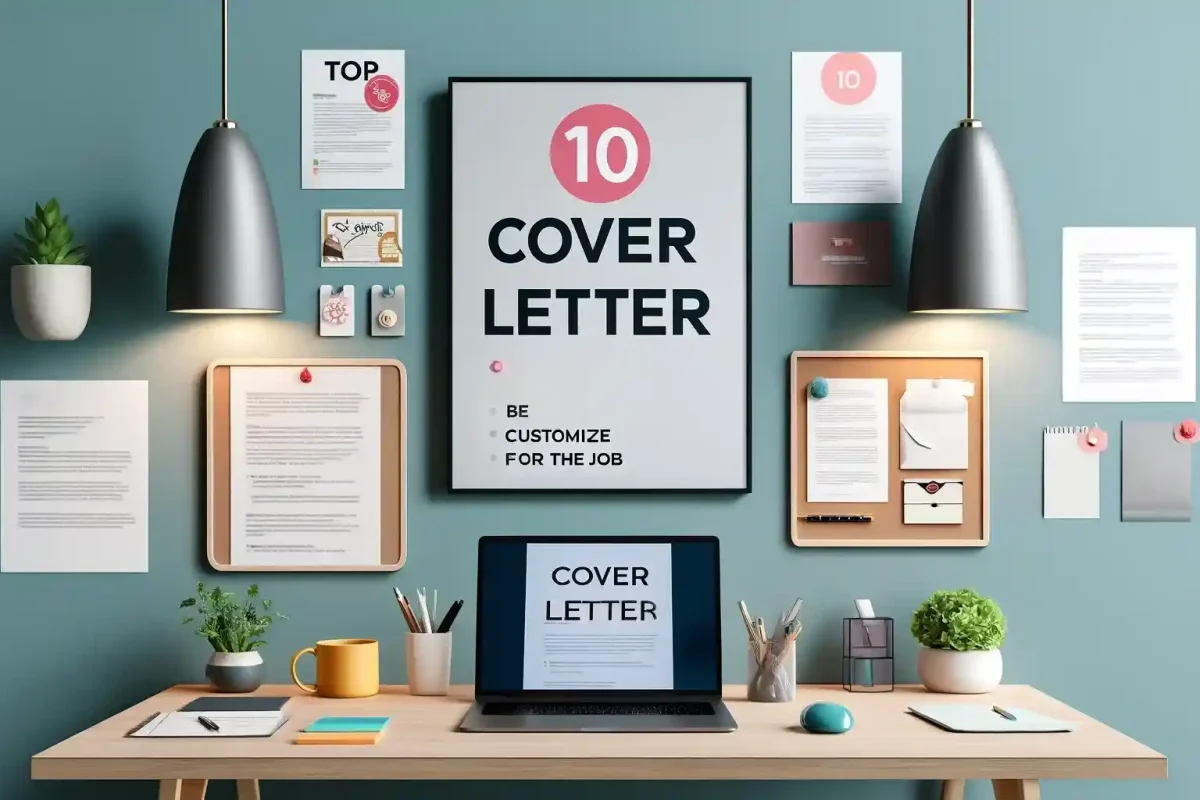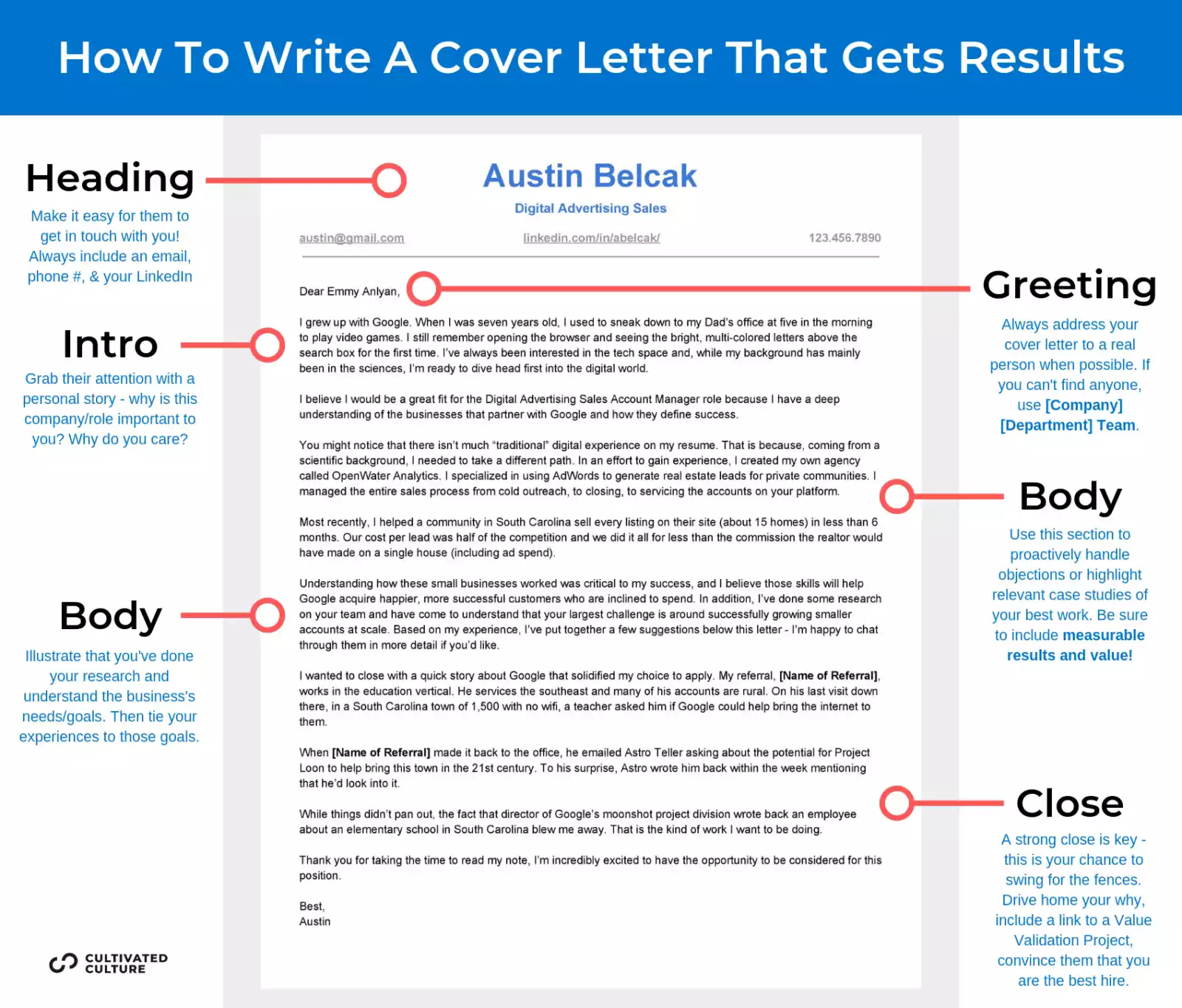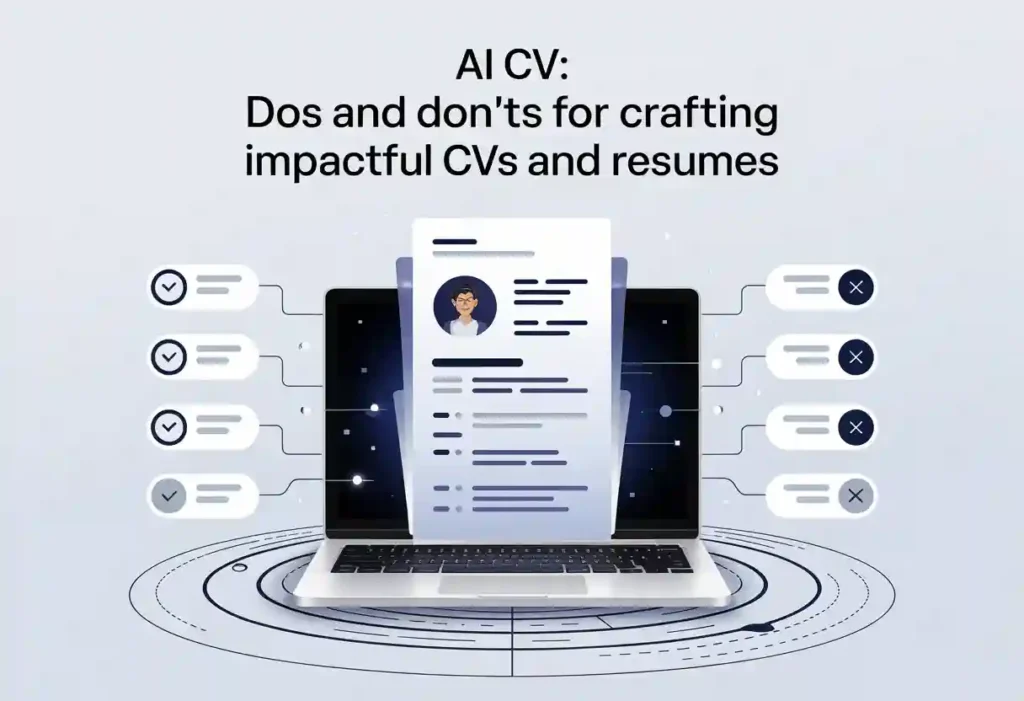Why do you need a cover letter?
The best cover letter tips will answer that question and more.
Imagine someone asking you to write an email explaining why you’d be a great employee.
Would you start by reciting a list of previous employment and qualifications?
Probably not.
Instead, you’d explain what you’re good at and how your skills fit the job description, including specific examples.
That’s what you should write in a cover letter.
Start it with our cover letter builder and the online resume builder. Achieve your career goals quicker.
If you’re interested in learning more tips for cover letter writing, keep reading! Learn how to write
a resume like a pro.
Like this post?
Sign up for our blog updates and never miss a post.
We’ll send you A FREE job interview eBook as a thank-you.
Hiring managers, primarily recruiting candidates for the IT industry, have seen excellent and nasty cover letters.
The CVJury team knows a good cover letter can distinguish between getting an interview and rejection.
Trust us, 80% of professionals write poor cover letters.
Learning what it takes to create a good one is necessary to succeed.
A good cover letter allows you to show a prospective employer how your experience and skills align with the job requirements.
With our top 10 cover letter tips, you’ll win interviews regularly.
And don’t forget to add a great CV to your cover letter; write yours on our online CV builder.
Top 10 Cover Letter Tips
1. Know the Purpose of a Cover Letter
If you don’t know the purpose of a cover letter, you probably don’t know how to write a good cover letter.
Although a CV provides an overview of a candidate’s qualifications, skills, and experience.
However, it’s rarely enough to determine your suitability for a given role.
That’s why hiring managers request a cover letter, an interview, and a CV.
PRO-TIP
Your cover letter should bridge the gap between an impersonal CV and a face-to-face interview.
2. Make an Impression with the Opening Line
You don’t need a grand opening; a direct but straightforward opening sentence will get the reader’s attention. See examples below:
- I’m interested in your project manager role because
- I’m writing to apply for your project manager position
- I am writing to express my interest in the recent posting for the project manager position
- I’m excited to apply for your project manager position
- I was excited to learn about your need for a project manager
- I’d like to be considered for your project manager position
- I am a business college graduate, and I am excited to start my career in professional project management
3. Don’t Repeat Your CV
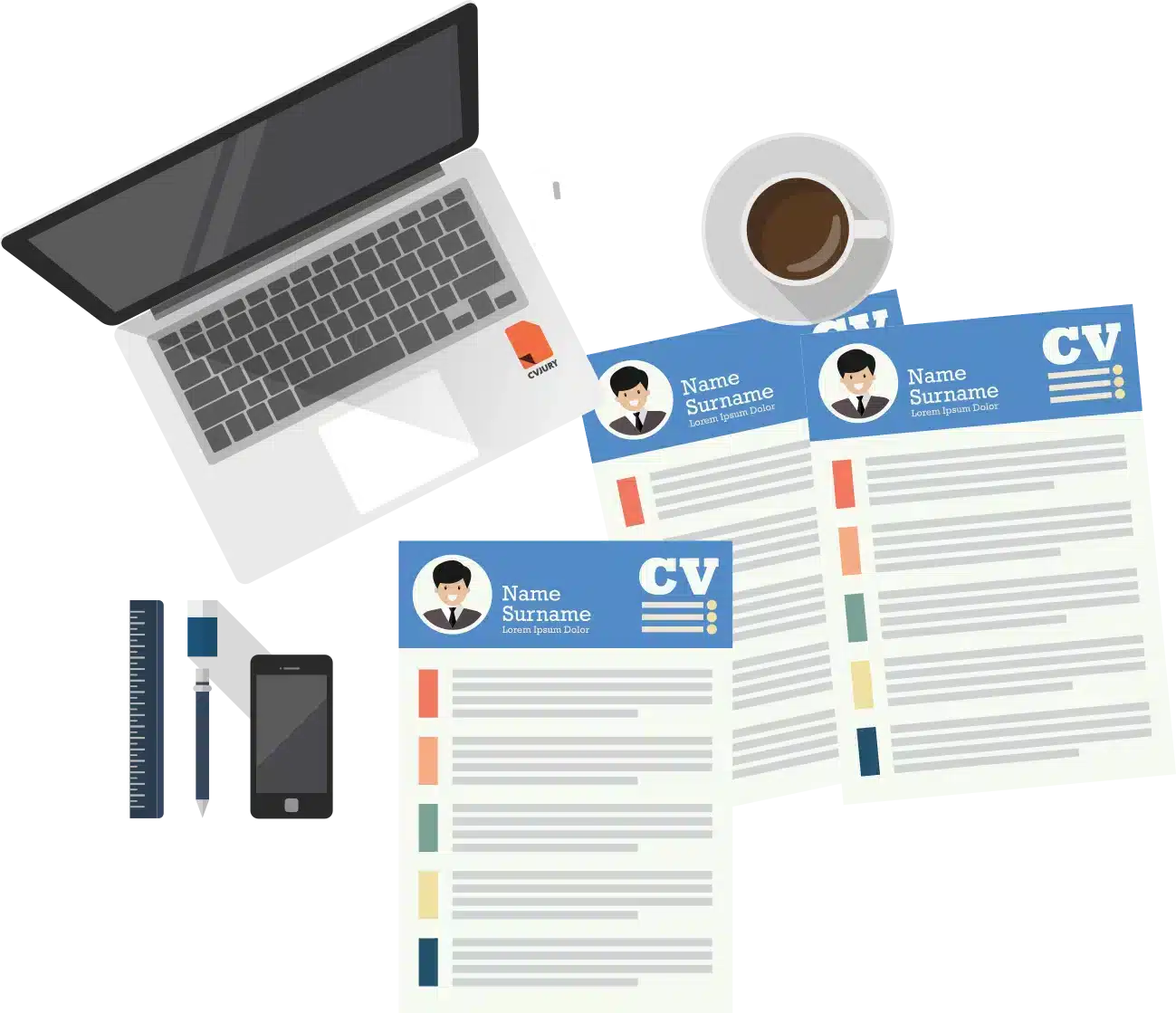
Regurgitating the contents of a CV in a slightly different order is a common mistake.
Avoiding this is one of the best tips for cover letter writing we can give you.
Instead, use your cover letter to state why you’re the best fit for the role rather than repeating your essential work experience.
For example, if the job requires a disciplined and hardworking individual, you can demonstrate your skills using personal examples.
Perhaps you faced challenges in a high-pressure workplace but completed your tasks.
Perhaps you grew up in an underprivileged area but still finished school with high grades.
Whatever your situation, you can use your background to your advantage in a cover letter.
Let’s look at some other examples.
Assume you were the best data analyst for your former supervisor, or she depended on you whenever she needed help.
Perhaps you have excellent social skills and excelled in handling aggressive customers.
Maybe a senior staff member in your workplace sees you as a problem-solver because you’re great at resolving complex issues.
PRO-TIP
Your cover letter should bridge the gap between an impersonal CV and a face-to-face interview.
4. Use the Hiring Manager’s Name
Another of our tips for cover letter writing is to address your cover letter to a specific person (e.g., Dear Bella Whitefield).
As trivial as it seems, it could make you stand out from the crowd.
And it’s preferable to use an impersonal introduction like “Dear Sir/Madam.”
However, you can address your cover letter to the position if you cannot find the name.
For example, ‘Dear Recruitment Team’ or ‘Dear Hiring Manager.’
Don’t worry about finding the exact name if it’s not accessible via the company website.
Plus, addressing your cover letter to the department team is preferable to addressing the wrong person.
PRO-TIP
Use the hiring manager’s name because it shows two important things.
- You’ve taken the time to research the company and staff.
- You know who the audience of your cover letter is.
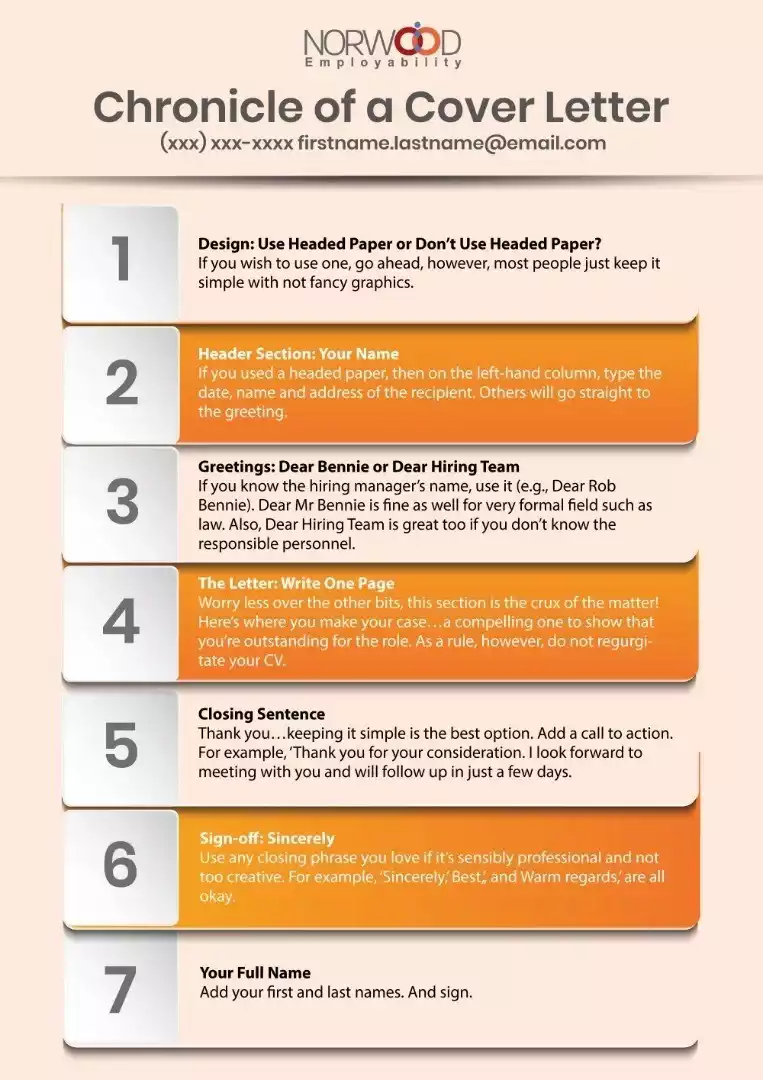
5. Show, Don’t Tell
Ever heard of the saying, “Action speaks louder than words.”
It’s easy to state that you’re hardworking, a great communicator, and committed.
Most people will include one of the above descriptors in their cover letter or CV.
Those statements hardly hold water because they are not measurable.
Instead, demonstrate your hard work, great communication skills, and commitment by providing examples of achievements and experiences that demonstrate those traits.
Let’s compare these two statements.
1. “I pay exceptional attention to detail, have excellent communication skills, and have a talent for managing complex projects by prioritizing and multitasking.”
2. “Besides being flexible and responsive, I’m also a fanatic for details, particularly regarding the presentation.
One of my recent projects involved coordinating a 200-page grant proposal.
I proofread and edited the narratives provided by the division head, formatted spreadsheets, and ensured that every line was letter-perfect and that the entire finished product conformed to the specific guidelines of the RFP.
As a result, a five-year, $1.5 million award was granted.
I believe in applying this same attention to detail to all tasks, from preparing the materials for a top-level meeting to ensuring the copier never runs out of paper.”
The first sentence is generic and unconvincing.
Meanwhile, the second is engaging, well-explained, and believable.
Most job applicants write cover letter lines like the first example.
If you use our cover letter tips, you’re guaranteed to be a step ahead of other applicants.
6. Address Any Grey Areas

Our next cover letter tip involves addressing any grey areas, but what do we mean by that?
For specific jobs, you may find that you’re over-qualified or under-qualified.
You may be significantly older or younger than the average candidate.
You may be a career changer with extensive work experience, but not in the field you’re applying for.
In these situations, a cover letter is your golden ticket.
It offers you a chance to say, “Wait a minute — here’s why I could be the perfect match for the position.
And therefore, you should take a chance on me.”
For instance, suppose you’re overqualified. Acknowledge that you know the situation and explain why you’re interested in the job.
Conversely, if you’re underqualified, explain why the hiring manager should consider training you.
Furthermore, if your work experience is in another field and you’ve been retraining for the role you’re currently applying for.
Highlight that and explain your reasons for changing career paths.
PRO-TIP
The hiring manager may dismiss your application if you don’t provide context and a compelling explanation.
7. Write a Custom Cover Letter for Each Application
Sending a generic, one-size-fits-all cover letter is almost certainly going to fail.
If it’s vague and you think another candidate could write something almost identical, it’s not good enough.
Instead, tailor your cover letter to the specific organization and job position.
PRO-TIP
Research specifics about the organization and the advertised position, company ethics, essential statistics, company background, etc.
Then, incorporate them into your cover letter.
8. Keep It Concise
Unless application guidelines specify, your cover letter shouldn’t be longer than one page.
Remember that hiring managers will have a lot of applications to read through.
Additionally, the ability to craft a concise cover letter is a literary skill, and many employers look for literary skills.
Avoid fluffy filler sentences and focus on direct examples demonstrating your suitability for the position.
On the other hand, if you’ve only written two or three short paragraphs, you might be underselling yourself.
Alternatively, you might give the impression that you can’t be bothered, don’t understand the job description, or don’t have enough experience or skills.
PRO-TIP
You may be writing too much if your cover letter is more than one page.
Take a second look and cut out anything irrelevant to the job description or company.
9. Consider Your Tone
If you want to show some personality and humor, go ahead.
Yet, it is safer to maintain a formal tone in some fields, such as the legal profession.
The best cover letters must be warm and demonstrate your communication skills.
No one wants to hire a robot (yet!), so there’s no need to write like one.
Making your letter conversational gives it a human touch and allows the hiring person an insight into your personality.
PRO-TIP
Write as you would to a colleague you don’t know very well; light and friendly but still respectful.
Here’s an example of a winning cover letter from Austin Belcak of Cultivated Culture.
CVJury has demonstrated three best examples as well for you to emulate.
10. Don’t stress too much about the small details.
Instead, focus on the content.
More Essential Cover Letter Tips
Dos
- Send your cover letter to a specific person, preferably the hiring manager, by name.
- Address your cover letter to the department team when the hiring manager's name is unclear or unavailable.
- Use a personalized, respectful, modern, and non-generic introduction to show you are thoughtful about your job application.
Don'ts
- Address the hiring manager by their first name unless they ask you to.
- Downplay your worth; this is not the time to be humble.
- Leave the subject heading blank.
- Avoid addressing the hiring manager informally unless they request it. Keep things formal.
Start using these top 10 cover letter tips; you’ll win interviews before you know it.
For more inspiration, check out and download 25 free cover letter examples.
Tailor it to your role. Our free resume scanner is always handy, so you get a well-optimized document.
Read our best article on resume builders and templates. Learn how to find a job quicker with our expert tips.
Related Resources: Cover Letter Tips
- Writing a Cover Letter That Gets the Job Done
- Writing the Curriculum Vitae
- Cover letter builder
- LinkedIn summary templates
- LinkedIn profile builder
